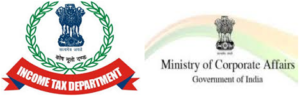
The income tax (I-T) department and the Ministry of Corporate Affairs (MCA) have signed a pact to regularly share data, including PAN and audit reports of firms, to crack down on shell companies, the government said on Thursday.
The pact aims at curbing the menace of money laundering, black money, and misuse of corporate structure by shell companies, a finance ministry statement said. It added a memorandum of understanding for Automatic and Regular Exchange of Information was signed between the MCA and the Central Board of Direct Taxes (CBDT) on September 6 and took effect the same day.
Under the pact, tax authorities will now relay audit reports of corporate entities and specific information from their I-T returns, along with PAN data, to the MCA.
Besides, financial statements filed by corporate entities with the Registrar of Companies, returns of allotment of shares, and statements of financial transactions received from banks will now be shared between the two departments.
“A data-exchange steering group has also been constituted for the initiative. It will meet periodically to review the data exchange status and take steps to further improve the effectiveness of the two agencies,” the finance ministry added.
The MoU will ensure that both the MCA and the CBDT have seamless PAN-CIN (corporate identity number) and PAN-DIN (director identity number) linkage for regulatory purposes.
“The information shared will pertain to both Indian firms as well as foreign ones operating in India,” the statement said.
The data will also be shared for the purpose of carrying out scrutiny, inspection, investigation and prosecution.
The government has already said that about 100,000 directors will be disqualified for their association with shell companies. The MCA is in the process of cancelling the registration of 209,000 companies that have not been carrying out business activities for a long period. Besides, banks have been asked to restrict operations of these companies’ bank accounts by their directors or their authorised representatives.
Following deregistration of over 200,000 companies, currently there are about 1.1 million companies with active status.
Rakesh Nangia, managing partner, Nangia & Co, said, “Seamless exchange of information on PAN records and audit report between the MCA and the CBDT will equip the government to crack down on shell companies, thereby cleaning the economy of devices used for generating and circulating the menace of black money.”
Abhishek Goenka of PwC sought to caution the authorities that the data should be used with adequate safeguards, and does not become a basis for blanket notices.
Prior to this, the government had identified over 100,000 directors for disqualification. These directors have been associated with shell companies. The MCA has put the SFIO on the job to investigate these directors.
The MCA is in the process of cancelling the registration of 209,000 companies that have not been carrying out business activities for a long period. Besides, banks have been asked to restrict operations of these companies’ bank accounts by their directors or their authorised representatives.
 The income tax (I-T) department and the Ministry of Corporate Affairs (MCA) have signed a pact to regularly share data, including PAN and audit reports of firms, to crack down on shell companies, the government said on Thursday.
The income tax (I-T) department and the Ministry of Corporate Affairs (MCA) have signed a pact to regularly share data, including PAN and audit reports of firms, to crack down on shell companies, the government said on Thursday.

